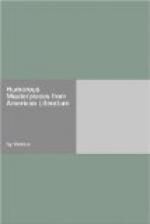“Truth lies at the bottom of a well, Sister Hope,” said Brother Timon, pausing to detach his small comrade from a gate, whereon she was perched for a clearer gaze into futurity.
“That’s the reason we so seldom get at it, I suppose,” replied Mrs. Hope, making a vain clutch at the mirror, which a sudden jolt sent flying out of her hands.
“We want no false reflections here,” said Timon, with a grim smile, as he crunched the fragments under foot in his onward march.
Sister Hope held her peace, and looked wistfully through the mist at her promised home. The old red house with a hospitable glimmer at its windows cheered her eyes; and, considering the weather, was a fitter refuge than the sylvan bowers some of the more ardent souls might have preferred.
The new-comers were welcomed by one of the elect precious,—a regenerate farmer, whose idea of reform consisted chiefly in wearing white cotton raiment and shoes of untanned leather. This costume, with a snowy beard, gave him a venerable, and at the same time a somewhat bridal appearance.
The goods and chattels of the Society not having arrived, the weary family reposed before the fire on blocks of wood, while Brother Moses White regaled them with roasted potatoes, brown bread and water, in two plates, a tin pan, and one mug; his table service being limited. But, having cast the forms and vanities of a depraved world behind them, the elders welcomed hardship with the enthusiasm of new pioneers, and the children heartily enjoyed this foretaste of what they believed was to be a sort of perpetual picnic.
During the progress of this frugal meal, two more brothers appeared. One a dark, melancholy man, clad in homespun, whose peculiar mission was to turn his name hind part before and use as few words as possible. The other was a bland, bearded Englishman, who expected to be saved by eating uncooked food and going without clothes. He had not yet adopted the primitive costume, however; but contented himself with meditatively chewing dry beans out of a basket.
“Every meal should be a sacrament, and the vessels used should be beautiful and symbolical,” observed Brother Lamb, mildly, righting the tin pan slipping about on his knees. “I priced a silver service when in town, but it was too costly; so I got some graceful cups and vases of Britannia ware.”
“Hardest things in the world to keep bright. Will whiting be allowed in the community?” inquired Sister Hope, with a housewife’s interest in labor-saving institutions.
“Such trivial questions will be discussed at a more fitting time,” answered Brother Timon, sharply, as he burnt his fingers with a very hot potato. “Neither sugar, molasses, milk, butter, cheese, nor flesh are to be used among us, for nothing is to be admitted which has caused wrong or death to man or beast.”
“Our garments are to be linen till we learn to raise our own cotton or some substitute for woollen fabrics,” added Brother Abel, blissfully basking in an imaginary future as warm and brilliant as the generous fire before him.




